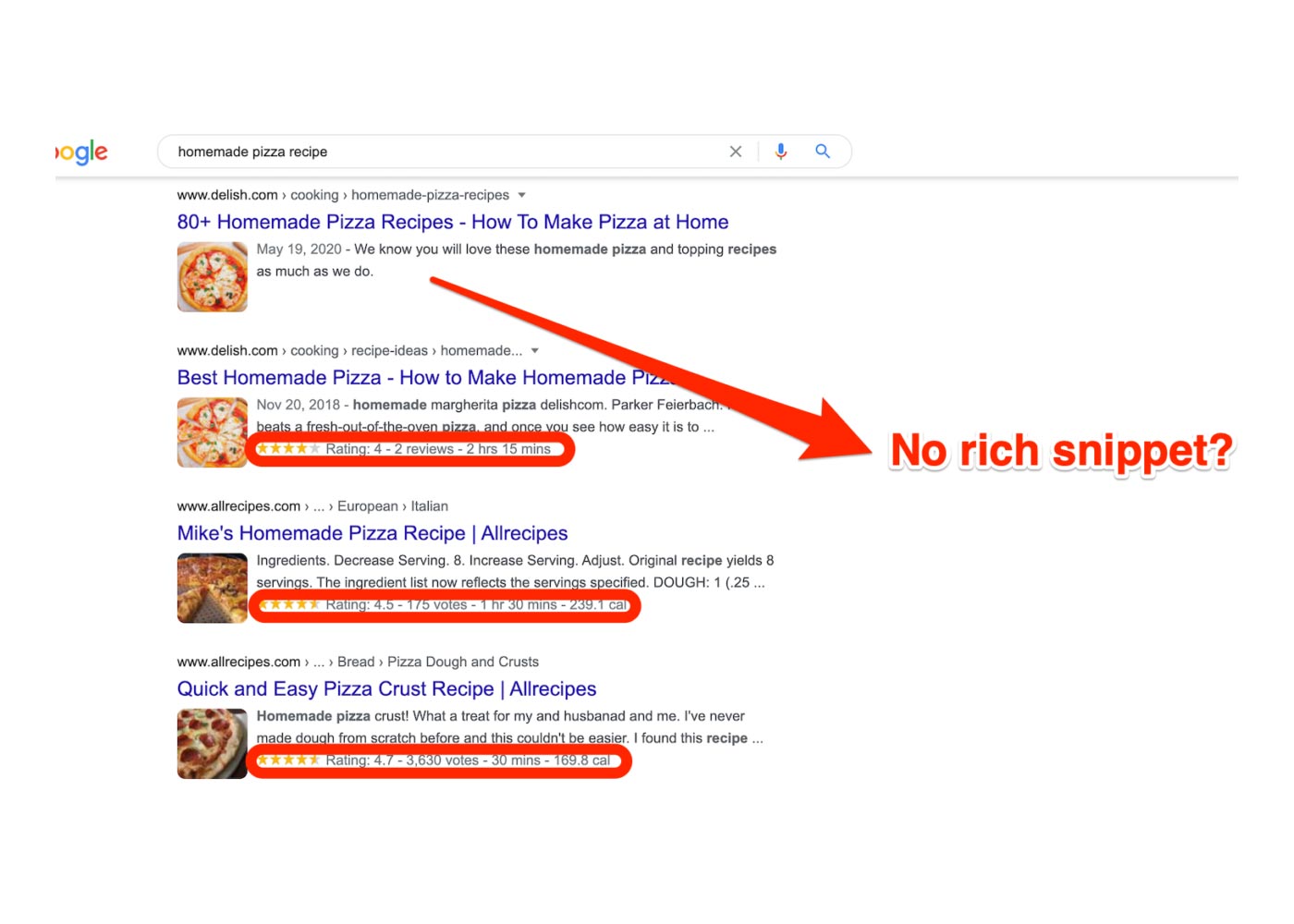Rich snippets are a powerful tool for driving traffic to
your website and boosting visibility on search engine results pages. By
providing additional information about your website's content, rich snippets
can help improve click-through rates and attract more engaged users to your
site. However, implementing rich snippets requires a solid understanding of
structured data and best practices for optimization. In this article, we'll
explore everything you need to know to get started with rich snippets, including
how to implement structured data, optimize your content, test and monitor your
snippets for success, and avoid common mistakes. We'll also cover advanced
strategies for maximizing the SEO and click-through potential of your rich
snippets.
Introduction to Rich Snippets and Why They Matter
If you've ever searched for a recipe, watched a movie
trailer, or looked up a product, you've likely come across a rich snippet. Rich
snippets are the extra bits of information that appear in search engine
results, providing a preview of what a webpage or website has to offer. These
snippets can include ratings, reviews, prices, and other helpful information.
But how do you get your own website to display rich snippets, and why do they
matter? Let's dive in.
What Are Rich Snippets?
Rich snippets are essentially an enhanced description of a
webpage that appears in search engine results. They can include a variety of
information, such as product prices, ratings, reviews, images, and more. Rich
snippets are powered by structured data markup, which is a way of formatting
HTML code to provide context for search engines.
Why Are Rich Snippets Important?
Rich snippets are important because they provide a more
detailed preview of what a webpage has to offer, helping users make more
informed decisions about which search results to click on. They can also
improve click-through rates, drive more traffic to your website, and even boost
your search engine rankings. In short, rich snippets can help your website
stand out in a crowded digital landscape.
Understanding Structured Data and its Role in Rich Snippets
What is Structured Data?
Structured data is a standardized format for providing
additional context and information about a webpage to search engines. It uses a
specific vocabulary of tags and properties, known as schema markup, to help
search engines understand the content of a webpage.
How Does Structured Data Impact Rich Snippets?
Structured data is the backbone of rich snippets. By adding
structured data markup to your website, you provide search engines with the
context they need to display rich snippets in search results. Without
structured data, your website may still appear in search results, but it will
lack the enhanced descriptions that make rich snippets so valuable.
Implementing Structured Data on Your Website for Rich Snippets
Types of Structured Data
There are many different types of structured data that you
can add to your website, depending on the type of content you offer. Some
common types of structured data include:
- Product information
- Local business information
- Recipes
- Events
- Reviews and ratings
- Articles and blog posts
How to Implement Structured Data on Your Website
Implementing structured data on your website requires adding
schema markup to your HTML code. You can do this manually, but it can be
time-consuming and complicated. Fortunately, there are many tools and plugins
available that can help simplify the process. Google's Structured Data Markup
Helper is a great place to start.
Optimizing Content for Rich Snippets: Best Practices and Tips
How to Optimize Content for Rich Snippets
To optimize your content for rich snippets, you need to
focus on providing clear, concise information that can be easily understood by
both humans and search engines. Here are a few best practices to keep in mind:
- Use schema markup to provide context and detail about your
content
- Create clear, descriptive titles and meta descriptions for
each page
- Include relevant keywords in your content
- Use header tags and other formatting to make your content
easy to scan
Best Practices for Rich Snippet Optimization
In addition to optimizing your content, there are a few best
practices to keep in mind when it comes to rich snippet optimization. These
include:
- Testing your structured data to ensure it's working
correctly
- Keeping your structured data up-to-date and accurate
- Monitoring your search engine results to see how your rich
snippets are performing
- Experimenting with different types of structured data to
see what works best for your website
By following these best practices, you can make the most of
rich snippets and harness the power of structured data to drive more traffic
and improve your search engine rankings.
Testing and Monitoring Rich Snippets for Success
If you want to boost your website's visibility in search
engine results pages (SERPs), adding rich snippets should be one of your top
priorities. However, just implementing structured data markup isn't enough. You
need to test and monitor your rich snippets to ensure they are effective and
error-free.
How to Test Rich Snippets
Google has a free tool called the Structured Data Testing
Tool that lets you test your markup code and preview how your rich snippets
will appear in SERPs. Simply enter the URL of the page you want to test or copy
and paste your code into the tool.
Once you run the test, the tool will highlight any errors or
warnings and provide suggestions on how to fix them. Make sure to test all of
your rich snippets and make any necessary changes before publishing them on
your site.
Tools for Monitoring Rich Snippets
After you've implemented your rich snippets, it's crucial to
monitor them to ensure they continue to appear correctly in SERPs. Google's
Search Console and Bing Webmaster Tools are two free tools that allow you to
monitor your website's performance in search.
In addition, there are several paid tools such as Moz and
SEMrush that offer more advanced features for tracking and analyzing your rich
snippets' performance.
Common Mistakes to Avoid When Implementing Rich Snippets
While adding structured data markup can significantly
improve your website's visibility in SERPs, there are several common mistakes
to avoid.
Common Errors in Structured Data Markup
One common error is using incorrect or outdated markup code.
Make sure to use the correct markup for your content and keep it up-to-date with
the latest schema versions.
Another mistake is not following the guidelines set by
search engines. For example, Google has strict guidelines on what types of
content are eligible for rich snippets and how to mark them up.
How to Avoid Penalties from Search Engines
Search engines can penalize websites that violate their
guidelines, so it's important to follow their rules to avoid being penalized.
Make sure to use ethical SEO practices and avoid any techniques
that can be considered spammy, such as keyword stuffing or cloaking. Also,
monitor your website regularly for any errors or penalties and fix them
promptly.
Advanced Strategies for Maximizing Rich Snippets for SEO and CTR
While adding rich snippets is a great way to improve your
website's visibility in SERPs, there are advanced strategies you can use to
maximize your results.
How to Use Rich Snippets to Improve SEO
One strategy is to use rich snippets to target specific keywords
and improve your website's ranking for those keywords. For example, if you have
a recipe website, you can use recipe structured data markup to target keywords
related to specific dishes.
Another strategy is to use rich snippets to highlight your website's
unique selling points, such as customer reviews or ratings, to stand out in
SERPs.
Maximizing Click-Through Rates with Rich Snippets
You can also use rich snippets to increase your website's
click-through rate (CTR) by making your snippets more visually appealing and
informative. For example, you can add images or videos to your snippets or
include additional information such as price or availability.
Make sure to test different variations of your rich snippets
to see which ones generate the highest CTRs and make adjustments accordingly.
Conclusion and Future Outlook for Rich Snippets
Rich snippets are an essential part of any SEO strategy, and
their importance is only expected to grow in the future.
Summary of Key Points
To summarize, testing and monitoring your rich snippets is
critical to ensure their success. Avoid common mistakes such as using incorrect
or outdated markup code and violating search engine guidelines. Advanced
strategies for maximizing your rich snippets include targeting specific
keywords, highlighting unique selling points, and increasing your website's
CTR.
What to Expect in the Future of Rich Snippets
As the use of structured data markup continues to grow,
search engines are likely to expand their use of rich snippets in SERPs. This
means it's more important than ever to optimize your website's rich snippets
for maximum visibility and performance. In conclusion, implementing rich
snippets can greatly improve your website's visibility and click-through rates
on search engine results pages. By following best practices for structured data
implementation and optimization, you can create rich snippets that stand out
from the competition and attract more engaged users to your site. By monitoring
your snippets for success, avoiding common mistakes, and exploring advanced
strategies for maximizing rich snippet potential, you can continuously improve
your website's performance and stay ahead of the curve in the ever-evolving
world of SEO.
Frequently Asked Questions
What are rich snippets?
Rich snippets are enhanced search results that include
additional information about the content of a website. This information can
include ratings, reviews, pricing, and other details that help users make more
informed decisions about whether to click through to a page.
How do I implement structured data for rich snippets?
Implementing structured data for rich snippets requires
adding schema markup to your website's HTML code. This markup tells search
engines what the content on your page is about and how to display it in search
results. There are several tools and plugins available to help simplify the
process of adding structured data to your website.
What are some common mistakes to avoid when implementing
rich snippets?
Some common mistakes to avoid when implementing rich
snippets include using incorrect markup, failing to test your snippets for
errors, and violating search engine guidelines for structured data
implementation. It's also important to avoid using spammy or misleading content
in your snippets, as this can result in penalties from search engines.
How can I monitor the success of my rich snippets?
There are several tools available that allow you to monitor
the performance of your rich snippets, including Google Search Console and
third-party SEO software. These tools can provide insights into how many clicks
and impressions your snippets are generating, as well as any errors or warnings
that need to be addressed. It's important to regularly monitor your snippets to
ensure they are performing optimally and to make adjustments as needed.
If you wish to contribute to our blog, please email us on morhadotsan@gmail.com.





















